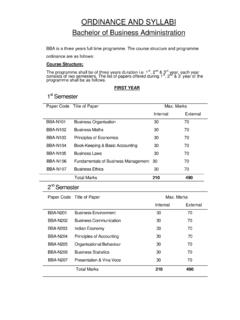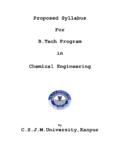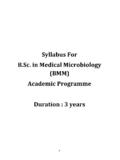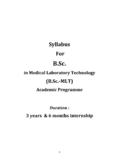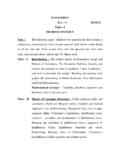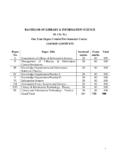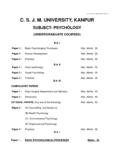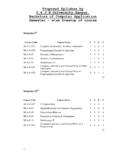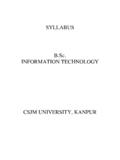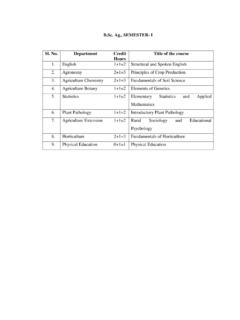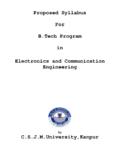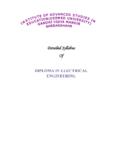Transcription of Proposed Syllabus For B.Tech Program in …
1 Proposed Syllabus For Program in Mechanical Engineering By ,Kanpur Proposed Syllabus by , Kanpur. Mechanical Engineering Semester wise breakup of courses I SEMESTER L T P Cr CHM-S101T Chemistry-I 3 1 0 3 CHM-S101P ChemistryLab-I 0 0 3 2 ESC-S101T Basic Elect. & Elect. Engg. 3 1 0 3 ESC-S101P Basic Elect. & Elect. Engg. Lab 0 0 3 2 MTH-S101 mathematics -I 3 1 0 4 PHY-S101T Physics -I 3 1 0 3 PHY-S101P Physics Lab I 0 0 3 2 TCA-S102T Workshop Concept 1 1 0 2 TCA-S102P Workshop Practice 0 0 3 3 II SEMESTER HSS-S101 Communicative English 3 1 0 4 ISC-S101T Programming and Computing 3 0 0 3 ISC-S101P Programming and Computing Lab 0 0 3 2 MTH-S102 mathematics -II 3 1 0 4 PHY-S102T
2 Physics-II 3 1 0 3 PHY-S102P Physics Lab-II 0 0 3 2 TCA-S101 Engineering Drawing 2 0 3 5 III SEMESTER ESC S201 Engineering Mechanics 3 1 0 4 ESC S202 Thermodynamics 3 1 0 4 MTH S201 mathematics III 3 1 0 4 MEE-S201T Mechanical Design & Drawing 2 0 0 3 MEE-S201P Mechanical Design & Drawing Lab 0 0 3 2 MEE-S202 Basic Solid Mechanics 3 1 0 4 IV SEMESTER HSS-S201 Industrial Management 3 0 0 4 MEE S203T Kinematics And Mechanism 3 1 0 3 MEE S203P Kinematics And Mechanism Lab 0 0 3 2 MEE-S204 Basic Fluid Mechanics & 3 1 0 4 Rate Processes MEE-S205T Materials & Mechanical Metallurgy 3 0 0 3 MEE-S205P Materials & Mechanical 0 0 3 2 Metallurgy Lab MEE-S206 Advanced Solid Mechanics 3 1 0 4 V SEMESTER L T P
3 Cr CHM-S301 Chemistry II / MTH-S301 3 1 0 4 Discrete mathematics MEE-S301 Dynamics of Machines & Vibrations 3 0 0 4 MEE-S302 Advanced Fluid Mech. 3 0 0 4 MEE-S303 IC Engines, Steam & Nuclear Power 3 0 0 4 MEE-S304 Lab-1, 0 0 3 4 Appl. Mech., Fluid Mech., Vibrations VI SEMESTER MEE-S305 Heat Transfer 3 0 0 4 MEE-S306 Production Processes 3 0 0 4 MEE-S307 Design Of Machine Elements 3 1 0 4 MEE-S308 Lab-2, I C Engines.
4 Heat Transfer 0 0 3 4 Departmental Elective 3 0 0 4 SSM-S302 Seminar 0 0 2 2 HSS-S301 Professional Communication 1 1 1 2 VII SEMESTER HSS-S401 Industrial Economics 3 0 0 4 MEE-S401T Computer Aided Manufacturing 3 0 0 3 MEE-S401P Computer Aided Manufacturing Lab 0 0 3 2 MEE-S402T Refrigeration & Air-Conditioning 3 0 0 3 MEE-S402P Refrigeration & Lab 0 0 3 2 MEE-S403 Industrial Management & 3 0 0 4 Production System PRT-S401 Project-I 0 0 6 4 SST-S301 Summer Trainning 0 0 2 2 VIII SEMESTER MEE-S404T Measurements and Controls 3 0 0 3 MEE-S404P Measurements and Metrology Lab 0 0 3 2 MEE-S405T Thermal Turbomachinery & 3 0 0 4 Compressible Flows MEE-S405P Fluid Machinery Lab 0 0 3 2 MEE-S406T Computer Aided Design 3 0 0 3 MEE-S406P Computer Aided Design Lab 0 0 3 2 Departmental Elective 3 0
5 0 4 PRT-S402 Project-II 0 0 6 4 List of Departmental Elective Courses MEE - S501 Robotics 3-0-0-4 MEE - S502 Automobile Engineering 3-0-0-4 MEE - S503 Non Conventional Energy Sources 3-0-0-4 MEE - S504 Operation Research 3-0-0-4 MEE - S505 Unconventional Manufacturing Process 3-0-0-4 MEE - S506 Nuclear Power Engineering 3-0-0-4 MEE - S507 Computer Simulation and Modelling 3-0-0-4 MEE - S508 Metal Forming 3-0-0-4 MEE - S509 Machine Tool Design 3-0-0-4 MEE - S510 Pneumatic Control and 3-0-0-4 Low Cost Automation MEE - S511 Maintenance Management 3-0-0-4 MEE - S512 Finite Element Methods 3-0-0-4 MEE - S513 Composite Materials 3-0-0-4 MEE S514 Fracture and Fatigue 3-0-0-4 MEE - S515 Optimization Method 3-0-0-4 MEE - S516 Computational Fluid Dynamics
6 3-0-0-4 Note: 1. Total No. of Lectures in each course should in the range of 40 to 45 per semester if per week three lectures are allotted. Department of Mechanical Engineering Detailed Syllabus of Program courses Course Code: CHM S101T Breakup: 3 0 0 3 Course Name: Chemistry - I Course Details: UNIT-I - Atoms and Molecules: 1. Need for wave mechanical picture of atomic structure [Photoelectric effect, de Broglie concept of matter waves], Derivation of schrodinger wave equation [as an example particle moving in unidimensional potential well] 2.
7 Chemical Bonding- Orbital concepts in bonding, and theory, diagrams, Intermolecular interactions. UNIT-II - Reaction Dynamics: Order, Molecularity, Rate law, Integrated rate equations, Methods of determining of order of reaction, Complex reaction kinetics- chain reactions and reversible reactions in detail, Catalysis and enzyme catalysis UNIT-III - Electrochemistry: Arrhenius theory of electrolytic dissociation, Transport number, Kohlrausch s law, Solubility product, Redox reaction, Electrochemical and concentration cells. UNIT-IV- Stereochemistry: Introduction, Chirality, Enantiomers, Diastereomers, Projection formula of a tetrahedral carbon, Geometrical isomerism, Conformers UNIT- V- Spectroscopic Techniques: General introduction to IR, NMR and Mass spectroscopy UNIT-VI - Organic Reactions: Introduction, Electron displacement effects, Organic intermediates, Types of reactions [addition, elimination and substitution reactions] UNIT-VII - Photochemistry.
8 Photoexcitation of organic molecules, Jablonski diagram, Laws of photochemistry and quantum yield, Some examples of photochemical reactions, Chemistry of vision and other applications of photochemistry. UNIT-VIII - Transition Metal Chemistry: Stucture of coordination compounds corresponding to coordination number up to 6, Tpes of ligands, Isomerism [geometrical, optical, ionization, linkage and coordination], Theories of bonding in coordination compounds- crystal field theory, Valence bond theory, Chelation. UNIT-IX - Laboratory Practical Classes: Text Books and References: Physical Chemistry- 1.
9 Atkins 2. Puri & Sharma Organic Chemistry- 1. Morisson & Boyd 2. Bahl and Bahl Inorganic Chemistry- 1. Lee 2. Rastogi Engineering Chemistry- Shashi Chawla Course Code: CHM S101P Breakup: 0 0 3 2 Course Name: Chemistry Lab- I Course Details: Exp. 01. To estimate the strength of the given unknown solution of Mohr s salt (Ferrous ammonium sulphate (FeSO4(NH4) ) using KMnO4 solution as an intermediate.)
10 Exp. 02. To prepare a sample of p-nitroacetanilide. Exp. 03. To prepare a sample of Aspirin. Exp. 04. Preparation of Tris (Thiourea) Copper (I) sulphate. Exp. 05. Preparation of Hexamine Nickel (II) chloride [Ni(NH3)6]Cl2. Exp. 06. Estimation of commercial caustic soda: Determination of the amounts of sodium carbonate and sodium hydroxide present together in the given commercial caustic soda. Exp. 07. Estimation of calcium ions present in tap water. Exp. 08. To determine the partition coefficient of acetic acid between n-butanol and water. Exp. 09. To study the photochemical reduction of a ferric salt (Blue)
